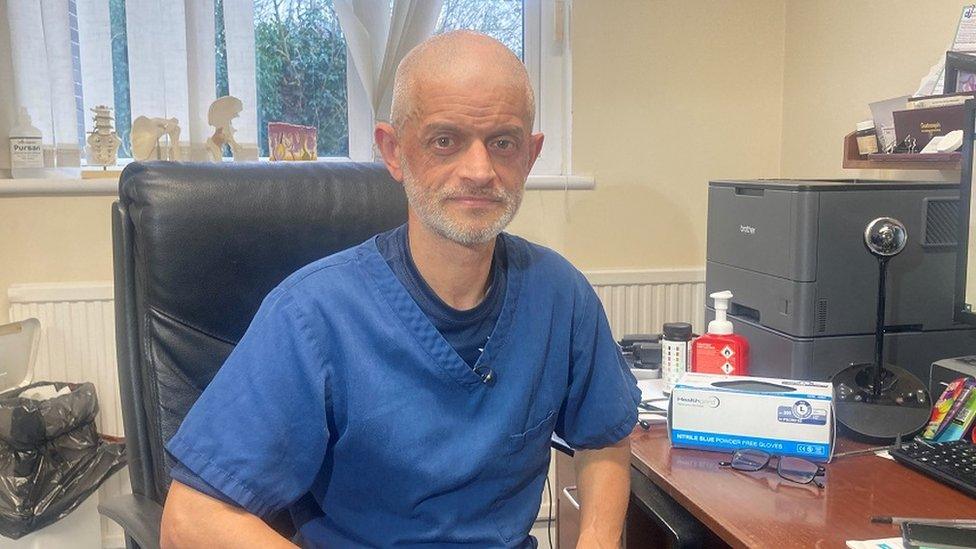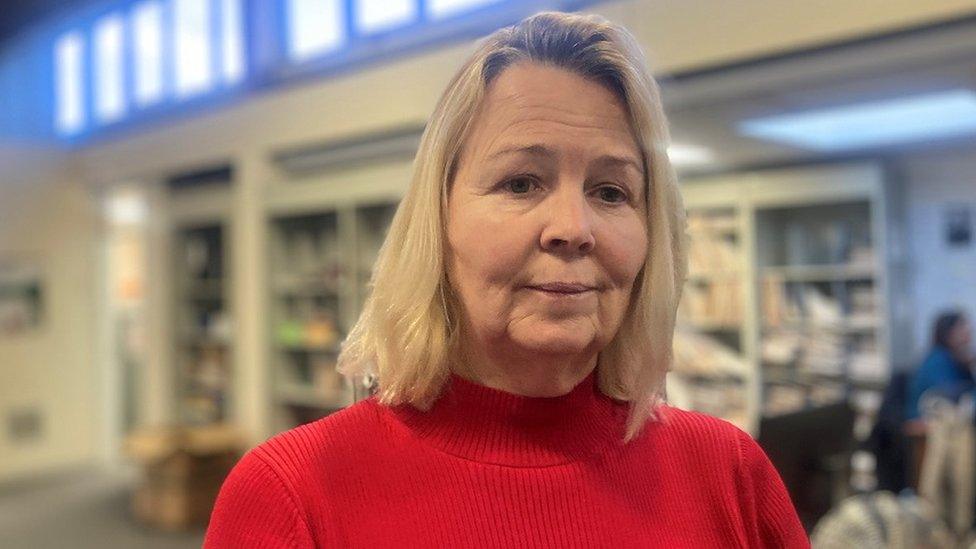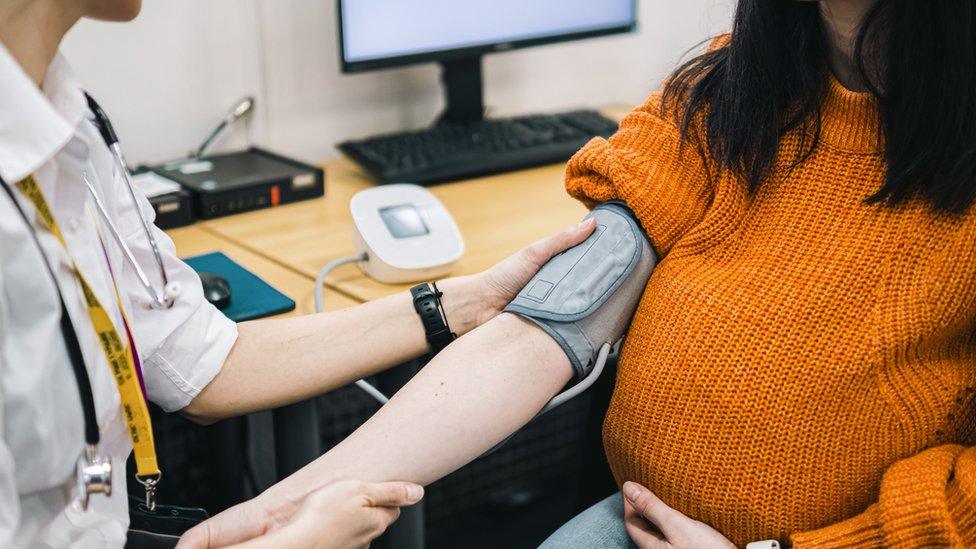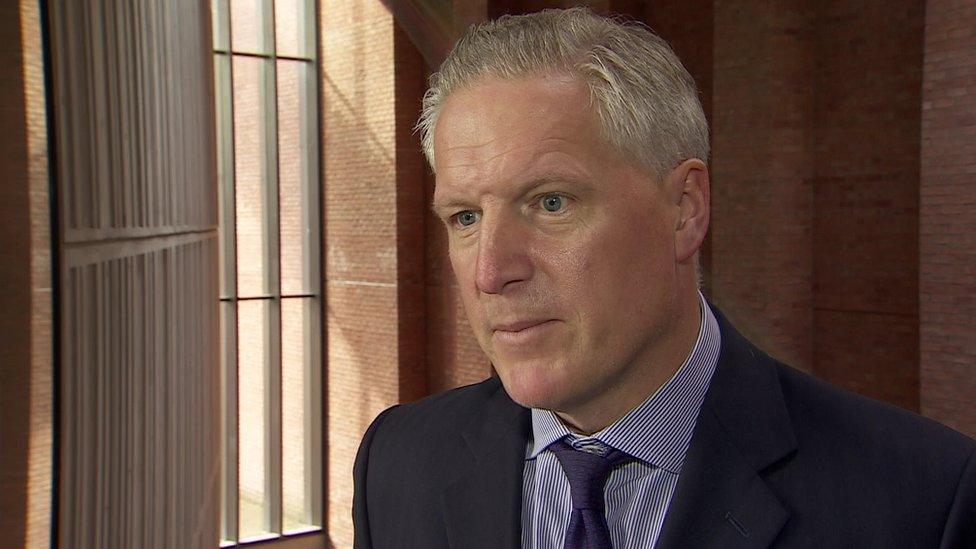GP access could become as hard as seeing NHS dentist, doctor warns
- Published

Dr Lalsingh says he and others are regularly seeing more than the 25 recommended patients a day
Seeing a GP could become as difficult as accessing an NHS dentist, a County Antrim doctor has said.
Larne Medical Practice is the 18th surgery in Northern Ireland to hand back its contract to the Department of Health.
Dr Ian Lalsingh, one of the practice's five partners, told BBC News NI there were simply not enough of them to safely oversee its 8,500 patients.
He said he was worried the GP system would "collapse".
Unless the practice recruits at least one other GP partner, in May an alternative provider will step in - possibly the local health trust - which will supply GPs including locums.
"My worry is that general practice will collapse. That's my greatest worry - I see so many have handed back their contract and there will be more this year," Dr Lalsingh said.
"My biggest worry is that we would end up with a system that is similar to how the dentists operate now, that it's very difficult to get to see an NHS dentist."
In 2023, two surgeries in Larne merged to become the largest medical practice in the area.
However, since then one GP has resigned which means there are too many patients for the remaining GPs to safely oversee.
Handing back a contract is a last resort and, according to Dr Lalsingh, a move no one wants.
Fewer GP surgeries
He said the worry for any new service was that it would rely on" stand-in doctors".
Dr Lalsingh said because these doctors would not be partners, he was concerned there would not be continuity of care and patients would see a different doctor every time.
At 52, Dr Lalsingh said he had hoped at this stage in his career to continue being a partner in a thriving surgery.
With no plans to retire, he hopes to be part of the solution but is realistic that finding other permanent GPs is unrealistic.
Northern Ireland has 318 practices, 9% fewer than in 2014 despite a growing and aging population.
While 18 practices have handed back their contracts to the Department of Health, another 100 practices are receiving "rescue support".
When GPs operating a medical practice hand their contract back it means they no longer intend to run it.
That may be due to issues such as retirement, staffing and recruitment problems or financial pressures facing the practice.
The Department of Health will then attempt to find a new GP or a group of GPs to take over the running of the surgery.

"At the moment there's a lot of doom and gloom around general practice and I don't believe that's a true picture", says Dr Black
Northern Ireland has the second-highest number of GPs per 100,000 registered population in the UK - Scotland has the highest.
General practice is fragile across the UK with issues including recruiting, retention, and funding familiar themes.
'Generational' differences
Dr Margaret Black who is also a partner in the Larne Practice, said she felt privileged to be a community doctor.
A GP for several decades, Dr Black is thinking of an exit plan but said she was not ready to go just yet.
"At the moment there's a lot of doom and gloom around general practice and I don't believe that's a true picture.
"Work-life balance is important but younger people view working differently now compared to older generations, " she said.
"The thing about it is if more people did a little more it would be better," she said.

The recommended daily number for each GP is 25 consultations
According to the BMA's safe working guidelines, once GPs have seen their recommended number of consultations any other patients should be advised to attend the local emergency department instead.
The recommended daily number for each GP is 25 consultations/patients.
Dr Lalsingh said he and others were regularly exceeding that number, which was not safe for either the patient or the doctor.
He explained that once his team reached capacity, they had no other option but to advise patients to use the "Phone First" service or go straight to hospital.
The Department of Health said it recognised that GPs and their practice teams were continuing to work in "increasingly challenging circumstances".
It said stabilisation of practices is a key concern.
However, the department also said: "The report of the Doctors' and Dentists' Review Body published in July 2023 recommended a 6% uplift for independent general medical practitioners for 2023-24.
"Within the context of the department facing a funding deficit, it has not been possible to progress the DDRB recommendations for 2023-24."
It added that it had provided £3.4m in funding to meet winter pressure demand and £4.3m to assist GPs to deliver proactive support and care to those in nursing homes.
In response to this, GPs said some of the funding was not new and did not meet increasing demand.
'Hybrid model'
A GP who introduced a new service offering private appointments alongside NHS work said its first week of operation had as not been without challenges, but he believed it was a sustainable system.
Dr Tom Black described the "hybrid" model as a last resort to secure the future of Abbey Medical Practice in Londonderry, which caters for more than 6,000 patients.
"We are working hard to try to meet the needs of those patients," Dr Tom Black told BBC Radio Foyle's The North West Today.
"Obviously we are putting our own NHS practice first and it's been very busy with all the different diseases around at the moment like Covid and the flu.
"We're struggling a little to combine the two, but the important thing is to ensure that the NHS practice, free at the point of delivery, is guaranteed and then do private patients in addition to that."
Dr Black said it is all "about getting that balance right" to ensure delivery of service.
- Published26 April 2023

- Published31 July 2023
